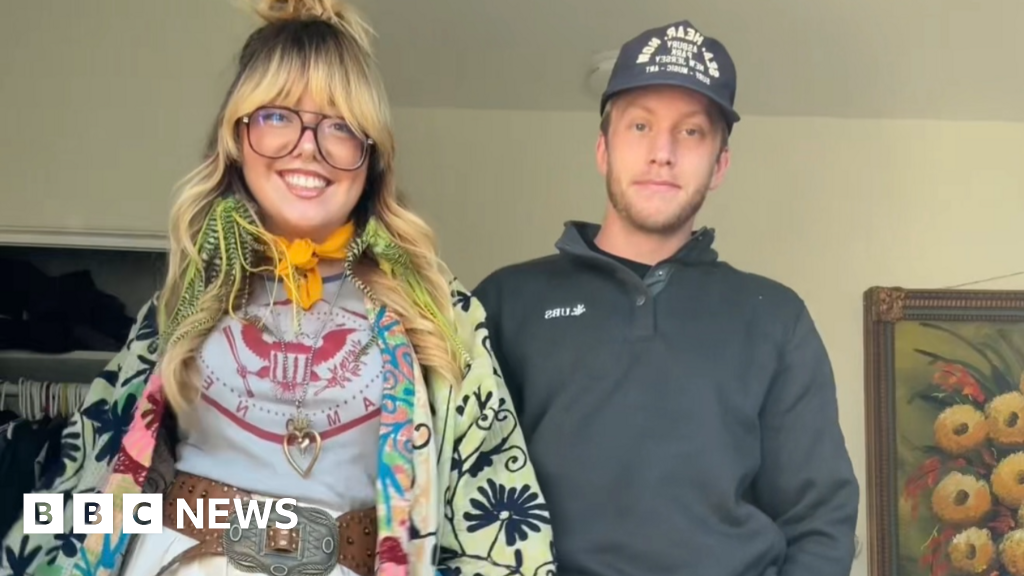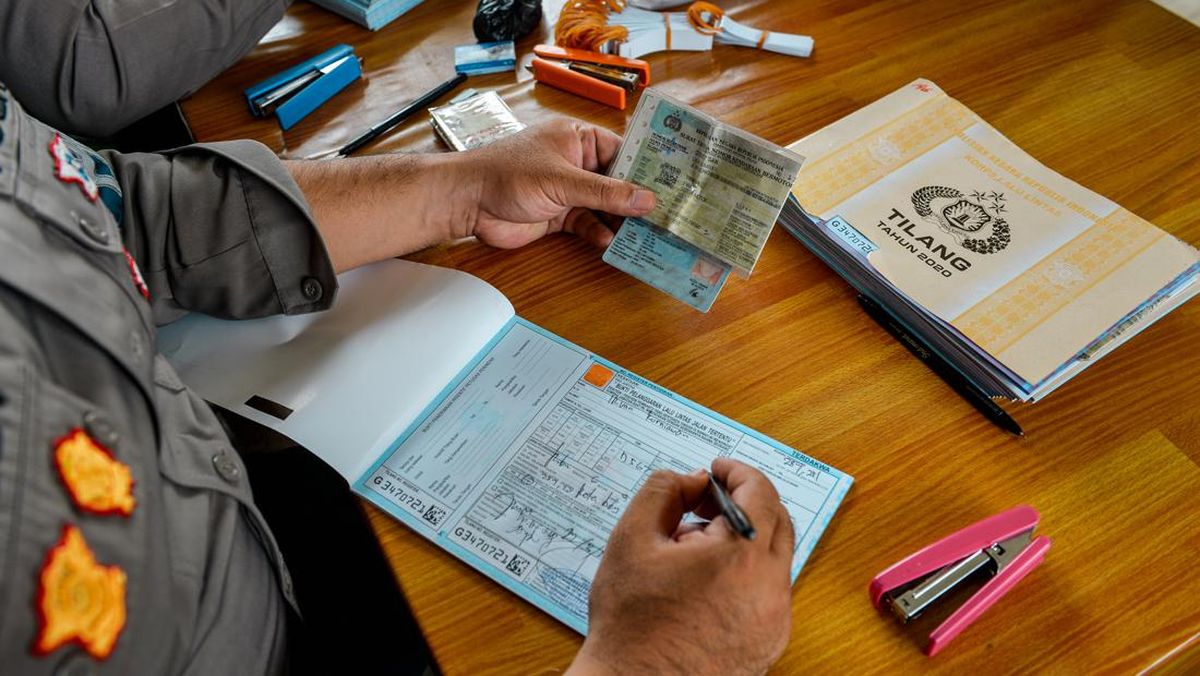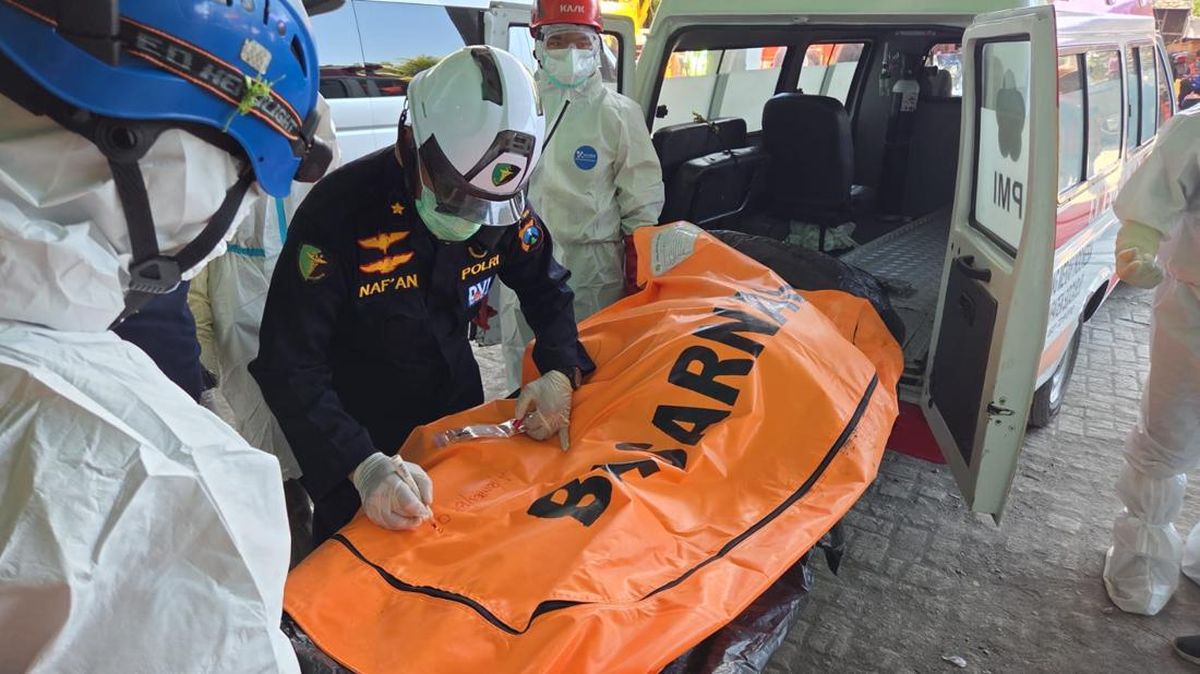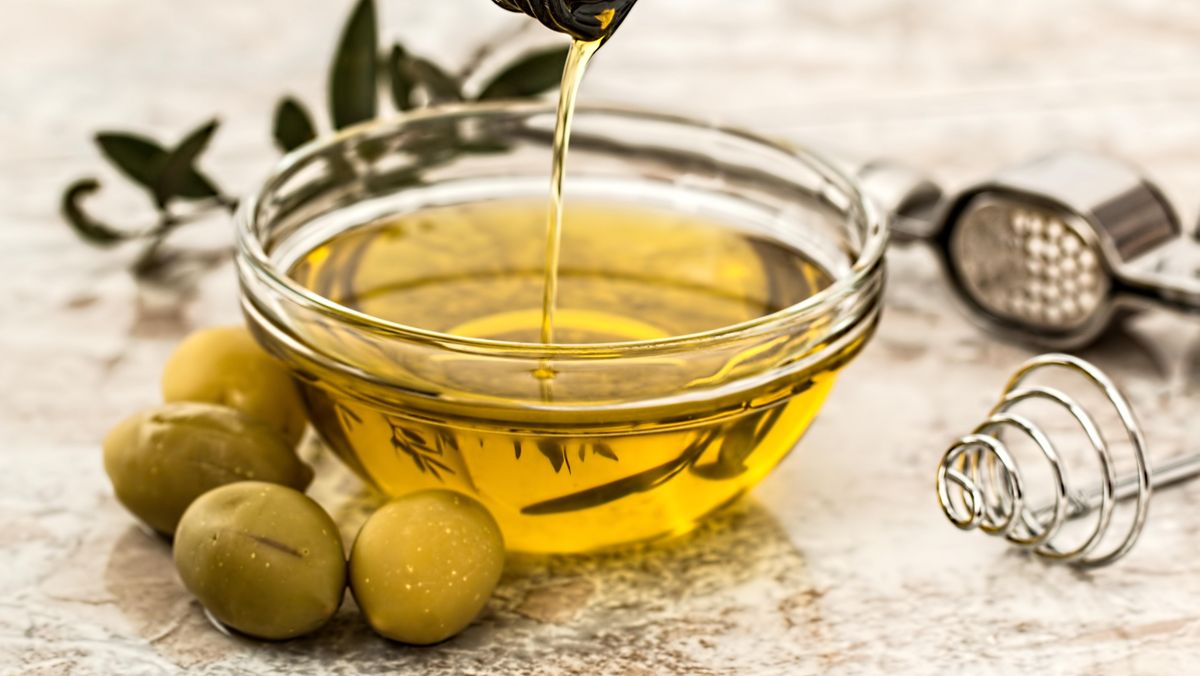There's no shortage of unbelievable stories that start with tequila, and this is one of them.
It involves a celebrity chef, a rock star and a highway heist that even Hollywood couldn't dream up.
Last November, two semitrucks carrying more than a million worth of Santo Tequila, a brand founded by Food Network star Guy Fieri and former Van Halen frontman Sammy Hagar, disappeared on its way to the warehouse.
If you're wondering how in the world that much tequila can just vanish…we did too.
Turns out international crime groups have found new ways to infiltrate the global supply chain online to steal hundreds of millions of dollars of goods.
Guy Fieri got a crash course on this sophisticated, high-tech theft after a sobering call from the president of his company.
Guy Fieri: Well, when the president of your company calls you and says, "We have a problem." I'm-- "What's up?" And he goes, "You're not gonna believe this, but we lost two truckloads of Santo Tequila."
Sharyn Alfonsi: Lost.
Guy Fieri: I said, "Elaborate on lost." He says, "Well, they disappeared." I said, "Well, wait, wait, wait, is this a hijacking?" I said, "Are the drivers OK?" I said, "Is this--?" 'Cause all my mind goes to is "Goodfellas." That's what I'm thinking is happening. And he said, "No, no, no, no, the trucks, it-- they were appropriated but we don't know where they are." I'm like, it-- it's not a needle in a haystack. I mean, this is a semi-tractor truck. My mind is swimming in exactly how do you lose, you know, that many thousands of bottles of tequila?
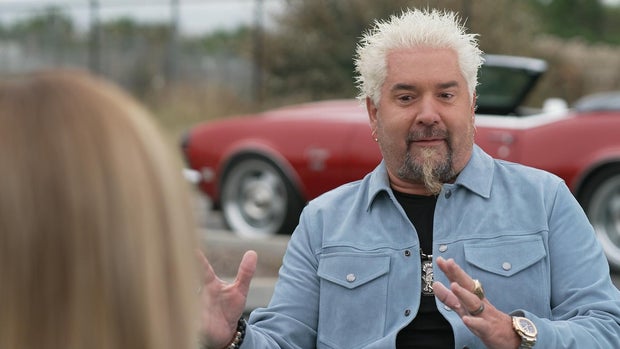 Guy Fieri co-founded Santo Tequila with former Van Halen frontman Sammy Hagar.
60 Minutes
Guy Fieri co-founded Santo Tequila with former Van Halen frontman Sammy Hagar.
60 Minutes
24,000 bottles of tequila, enough alcohol to fuel a lifetime of bad decisions.
The tequila started out like every other Santo batch: in western Mexico, where it was distilled and bottled. From there it was trucked to the U.S.-Mexico border, through customs and unloaded in Laredo, Texas.
The next day, it was moved into two semitrucks that were supposed to head to the Santo Tequila warehouse in Lansdale, Pennsylvania.
Sharyn Alfonsi: When was the first indication something's not normal here?
Dan Butkus: The product was due on Wednesday to our warehouse in Pennsylvania and on Thursday morning the logistics company told us there was a water pump cooler problem with the truck, it's just gonna be a slight delay.
Dan Butkus is the CEO of Santo Spirits. He told us like many small businesses, Santo doesn't have their own delivery trucks so they rely on a logistics company to hire trucking companies to ship their tequila.
On Friday, two days after the shipment was supposed to arrive, the trucking company started sending more excuses about why it was late.
Dan Butkus was informed that the truck was near Washington D.C. with a water pump issue. The logistics company emailed him a video they'd received of a broken-down semi with a note: "Looks like the issue is bigger than he thought. mechanics advised the truck will be fixed Saturday…he says he can deliver Sunday but I know y'all are closed so he can be there first thing Monday."
Sharyn Alfonsi: So the tequila's late, but you don't think anything's wrong because they're sending emails.
Dan Butkus: Yah. We don't think anything's wrong, we are a day or two behind delivery. And meanwhile, they track these with GPS.
Sharyn Alfonsi: So someone's checking to make sure the truck is where it says it is. And on GPS, it looks like--
Dan Butkus: Exactly.
Sharyn Alfonsi: --it's in D.C. where they say it is.
Dan Butkus: Then on Monday, we get an email that the truck is close, GPS says it's within a couple miles of our warehouse in Lansdale, can you let us know when it arrives?
The tequila never arrived in Pennsylvania.
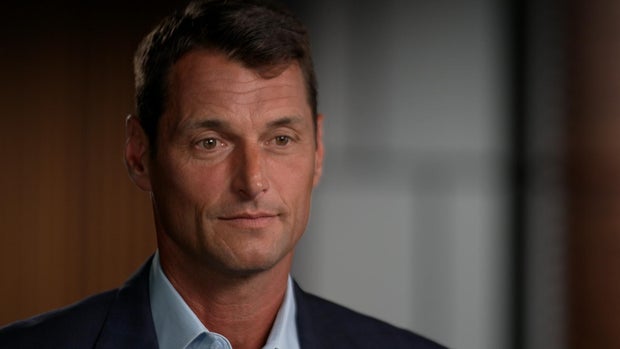 Dan Butkus is the CEO of Santo Spirits.
60 Minutes
Dan Butkus is the CEO of Santo Spirits.
60 Minutes
Here's what happened: the logistics company that worked for Santo hired a trucking company to move the tequila from Texas to Pennsylvania. But then, that trucking company outsourced the job to two other trucking companies, who then hired drivers.
The problem is those second trucking companies were fake — with phony letterheads, email addresses and phone numbers to appear legitimate.
It's a bit of a tractor-trailer shell game called "double brokering" and it happens more than you might expect.
Santo CEO Dan Butkus learned it was all part of an elaborate ruse, set up to buy time and steal the tequila.
Sharyn Alfonsi: So the email that came to you guys was fake, the picture was fake, the GPS was phony, the GPS--
Dan Butkus: Correct.
Sharyn Alfonsi: --signal was spoofed--
Dan Butkus: Was, they call it spoofed or emulated.
The thieves had manipulated the GPS to make it look like the tequila was still on its way to Pennsylvania.
Making matters worse, Guy Fieri and Sammy Hagar had been heavily promoting a new special tequila ahead of the holiday season, that took three and half years to make and all of it was on those two missing trucks.
Guy Fieri: It's not like we're sitting on huge reserves.
Sharyn Alfonsi: So you can't just say, "Turn it up, we're gonna keep making more."
Guy Fieri: That's exactly what we couldn't do. And then you have to go back to the retailer and say, "You're not gonna believe this."
Sharyn Alfonsi: How did this impact the business?
Guy Fieri: Oh, it hurt. It hurt bad. You know here we are, we're coming right into the fourth quarter. We lose all the tequila. We can't fill the shelves. We had to lay off players. You know, and that's the hardest thing? Knowing how many people are counting on you. So yeah, it hurt all the way around.
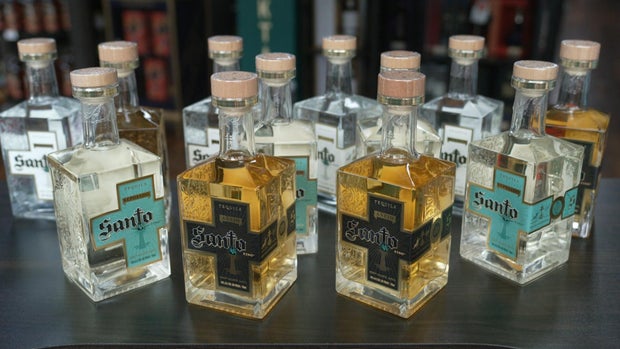 Two semitrucks carrying more than $1 million worth of Santo Tequila vanished on their way to the warehouse.
60 Minutes
Two semitrucks carrying more than $1 million worth of Santo Tequila vanished on their way to the warehouse.
60 Minutes
Sharyn Alfonsi: Did you think you were being targeted?
Guy Fieri: Well there's a side of me that still says yeah. It wasn't a-- a truckload of screwdrivers, you know? It wasn't a-- a truckload of baskets. They were coming across the border. Someone knew what it was. And tequila is a hot commodity.
That's why Keith Lewis was called in. He's a former cop who runs operations for CargoNet, a company that works with law enforcement to solve these kinds of crimes.
Lewis says, last year, U.S. businesses lost more than $230 million of goods to physical heists and those engineered online.
Sharyn Alfonsi: Let's start with the tequila case. How common is something like that?
Keith Lewis: It happens multiple times a day.
Sharyn Alfonsi: How does all of this impact consumers and the prices they pay?
Keith Lewis: 100% falls back on the consumer's shoulders.
Sharyn Alfonsi: 100%?
Keith Lewis: We pay at the pump for this. We pay at the grocery store, at the point of sale.
Lewis started investigating and began to piece together how the tequila heist was pulled off. He says the criminals created fake online profiles of trucking companies, bid on jobs they suspected might be valuable and hired unsuspecting drivers online. Then, instead of sending the drivers to the Santo warehouse in Pennsylvania, the criminals redirected them to deliver the shipment, into their hands.
Keith Lewis: And instead of taking it to the destination that was on the bill of lading, they told them to take that load to Los Angeles.
Sharyn Alfonsi: And the drivers are not in on this?
Keith Lewis: The driver that picked it up has no idea that he's committing a crime.
Sharyn Alfonsi: He thinks he's taking a legitimate load to a legitimate place?
Keith Lewis: Yes.
Sharyn Alfonsi: Doing his job?
Keith Lewis: Doing his job.
Sharyn Alfonsi: And he's being directed instead by criminals?
Keith Lewis: Correct.
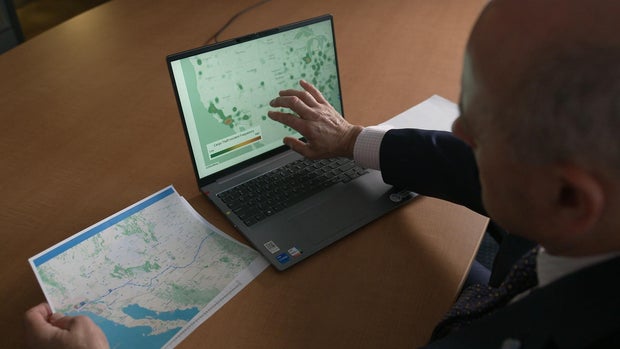 Keith Lewis, runs operations for CargoNet, investigated the case of the missing tequila.
60 Minutes
Keith Lewis, runs operations for CargoNet, investigated the case of the missing tequila.
60 Minutes
Once investigators determined "how" the tequila was diverted to California, they tried to figure out "who" did it.
But that was tougher, because unlike the kind of cargo theft you typically think of, like this - with guys in masks breaking into trucks with bolt cutters, there was no suspect description or fingerprints. Lewis says the tequila heist was orchestrated entirely online.
Sharyn Alfonsi: You're saying that these folks don't even need to be in the same country sometimes?
Keith Lewis: No. And we've tracked them to over 40 different countries around the world.
And investigators say the tequila heist had all the characteristics of a criminal gang operating out of Armenia – 7,000 miles from the U.S.-Mexico border where the tequila was last seen.
Keith Lewis says that kind of theft, where criminals remotely redirect cargo to steal it, has spiked 1,200% in the last four years.
Keith Lewis: If you think about online dating, for example, you can be anywhere in the world and set up a date with someone. It's the same thing in the supply chain. You can be anywhere in the world go online and book that load. And we don't do business face-to-face anymore. We don't have the hand-to-hand transactions. We're doing business by PDF file, by rate confirmations. We book that load with this individual, we've never met 'em, and bam, you have a million-dollar load of electronics goin' down the road hopefully to the right destination, or maybe it's not. It's become a global threat to our supply chain.
Nowhere is that threat higher than California. Last year, California had more goods stolen from trucks, trains and by cyber-criminals than any other state. That's because California's ports and highways make it a favorite target and hiding place for cargo thieves.
To respond, the Los Angeles Police Department created a special unit to tackle all kinds of cargo theft.
We were allowed to tag along with them one morning in August.
Before dawn, officers swarmed this block in southeast Los Angeles where they suspected a shipment of rifles stolen from a train were being hidden.
They found the rifles – but also stacks of stolen sneakers, piles of power tools, and designer clothes. They've also recovered pallets of protein shakes, energy drinks and vitamins.
Typically, it all ends up in an LAPD warehouse until the rightful owner can claim it.
Sharyn Alfonsi: It looks like a Costco in here. You've got everything.
Alan Hamilton: Yes. This is from a major manufacturer.
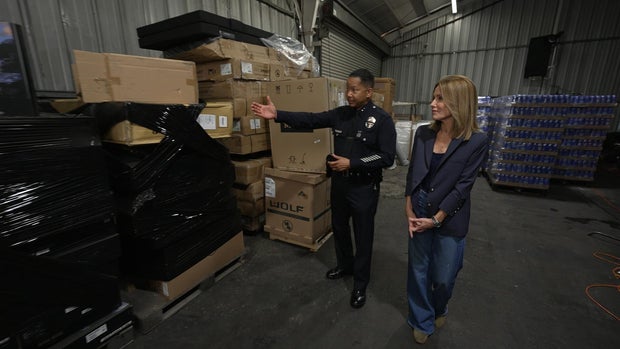 Alan Hamilton and Sharyn Alfonsi in an LAPD warehouse
60 Minutes
Alan Hamilton and Sharyn Alfonsi in an LAPD warehouse
60 Minutes
Alan Hamilton is the chief of detectives at the LAPD. He told us all this had been recovered by the Cargo Theft Unit just a week earlier.
Alan Hamilton: So we've got beer here-- that was stolen. We've got washing machines, we've got large appliances-- you see the subzero back there.
Sharyn Alfonsi: These are high-end appliances.
Alan Hamilton: Some of these are very high end, high price computers. The technology'll be turned back around and sold for, like, 30% to 40% on the dollar.
The LAPD says the stolen swag is typically sold online or in stores, including this one, to unsuspecting customers. In August, they busted two hardware stores stocked with stolen goods: $4.5 million worth.
Sharyn Alfonsi: What's the value of all the goods that you've recovered over the last year?
Alan Hamilton: So just for instance in 2024 the Los Angeles Police Department Cargo Theft Unit alone: $42.8 million in recovery just in the city of Los Angeles.
And it was that unit that cracked open the case of the missing tequila.
Detectives tracked down one of the drivers who picked up the tequila in Texas. He'd moved on to other jobs but told investigators he was directed by what he thought was a legitimate trucking company to leave the shipment at this industrial site in the San Fernando Valley.
That information ultimately led police to this warehouse in Southeast L.A. and 11,000 bottles of Santo tequila.
Guy Fieri told us the thieves and that second truck of tequila were never found.
Sharyn Alfonsi: It feels like a movie plot.
Guy Fieri: You know, the celebrity chef, the rock star—um, the small tequila company, you know, it all comes together, the special shipment.
Sharyn Alfonsi: Did you think they were gonna find it?
Guy Fieri: Gosh no.
Sharyn Alfonsi: They found it when?
Guy Fieri: Three weeks after, I'll say. So by then who knows what's happened to it, who knows what condition it's in and so forth. I'm just thinking, "This is all gonna go down the drain."
But after an inspection of the recovered bottles, Santo was able to put it back in stores and take a shot at a happy ending.
Sharyn Alfonsi: There's a lot of companies that this has happened to but they don't wanna talk about it. Why did you decide to speak about what happened?
Guy Fieri: It's not a thing I wanna go and brag about, like, "Hey, we got ripped off." It-- you know, that's not fun. But if it can happen to us with what I believe were pretty strong measures and security and awareness and, you know, communication and, you know, the way we do business. And to get ripped off for two full semitruck loads of tequila in today's age, then everybody's vulnerable.
Produced by Lucy Hatcher. Associate producer, Jessica Kegu. Broadcast associate, Erin DuCharme. Edited by Peter M. Berman.
Sharyn Alfonsi is an award-winning correspondent for 60 Minutes.


